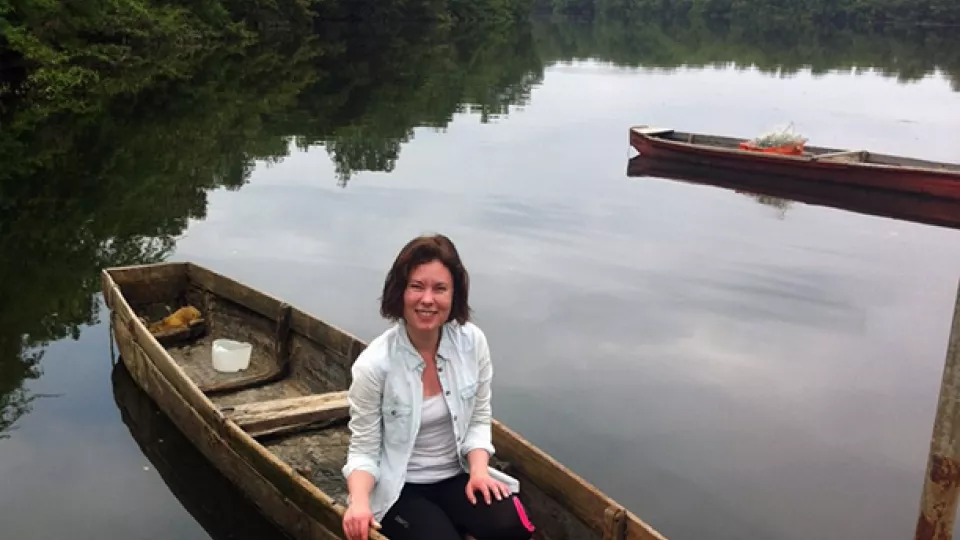Ten years ago, the concept of "blue carbon" was established to describe the carbon captured, protected or stored in coastal ecosystems, which can help mitigate climate change.
Terese Thoni recently defended her thesis "Making Blue Carbon – Coastal Ecosystems at the Science-Policy Interface" at the Centre for Environmental and Climate Research at Lund University. In her dissertation, she examines, among other things, the uncertainties affecting the measurement of blue carbon and how the relationship between science and politics affects the decision-making within the area.
”There is often limited knowledge within science about how politics works, how scientific results are used in politics and vice versa within politics”, Terese Thoni argues.
Studies of climate negotiations and mangrove forests
Terese has investigated the coastal ecosystems at both micro and macro levels. She has been participating in decision-making contexts at the UN climate negotiations and has studied previous sampling in mangrove forests. She has also had contact with researchers and environmental organizations working in the field, e.g. by investigating how biodiversity can be conserved in coastal ecosystems while prioritizing species useful for capturing carbon, and how market-based mechanisms affect the management of the coastal ecosystems.
”The previous discussions have been quite black and white and without nuance. In my dissertation I try to initiate a broader discussion”, says Terese, who believes that cross-border discussions are necessary to increase the understanding of the complexity of the area and to develop the right measures.
According to Terese Thoni, the UN Climate Panel is more solution-focused now than before and at the upcoming climate summit in December, which has been moved from Santiago, Chile to Madrid, Spain, issues related to the sea have been raised as topics to be discussed. Terese welcomes the fact that the sea has received more attention during the climate negotiations since the Paris Agreement. However, she also points out that it is the negotiating countries that set the agenda for what issues will be discussed during the summit and what measures they will then implement.
Uncertainty about effects affects priorities
Terese believes that the great uncertainty about the effects and benefits of blue carbon affects decision makers' attitudes and priorities of measures in the area. Developing measuring instruments for complex systems is difficult and the standardized measurement protocols now available are difficult to use when measuring the dynamic, coastal ecosystems. The current measurements therefore risk to overestimate or underestimate the benefits of the blue carbon. And it is difficult to simplify the measurements.
”You have to either accept the uncertainties as they are and develop a system which takes them into account or think of an alternative way. You can of course always measure more and take more samples, but these are expensive studies which risk to exclude parties and countries that cannot finance this”, says Terese.
Complex systems can generate incorrect values
Coastal ecosystems generate a range of benefits for us humans in addition to carbon benefits, for example by contributing to the improvement of biodiversity, fishery and climate adaptation. However, one risk of introducing coastal ecosystems into climate policy is that the other benefits may turn less visible. In addition, if the carbon benefits are underestimated, the risk is that the entire ecosystem’s value is underestimated. On the other hand, if the benefits of blue carbon are overestimated, we risk thinking that we have room to release more greenhouse gases than we actually do, according to Terese Thoni. Another risk is related to equating blue carbon investments with, for example, renewable energy investments, and at worst using blue carbon investments as an excuse for not reducing greenhouse gas emissions in other sectors.
”We cannot solve the climate issue without also dealing with our use of fossil fuels. That is why we need a system which recognizes this complexity”, Terese points out.
In its latest report with a partial focus on the sea, the UN Climate Panel IPCC stated that coastal ecosystems are being degraded at a global level. Terese Thoni believes that it is now important to investigate whether climate change and the subsequent consequences of sea level rise, temperature rise and changes in water quality in the form of, for example, increased algal bloom will cause the result that coastal ecosystems no longer function as a carbon sink in the future. The guidelines currently used to manage and control coastal ecosystems may therefore need to be re-evaluated.
”It is important that we don’t close our eyes to the existing problems, just because we feel stressed about having to act now”, Terese concludes.
